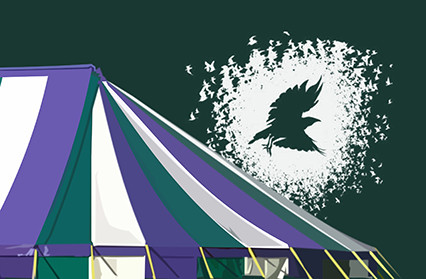Adam Somerset was on hand to hear Jon Gower chatting to Jim Perrin at the Dinefwr Literature Festival.
Jon Gower asks Jim Perrin to read an example of a country diary piece. The setting is Bosherston. Characteristically, the location is not an easy stroll from a parked car but a cove accessible only to an experienced climber. A grey falcon keeps an eye on the intruder. Perrin’s prose includes the line ‘I remember the excitement.’ That is the heart of his writing.
In his last book, West, Perrin writes that financial stringency might perhaps necessitate a move to a static caravan. That move from an adored Tanat Valley cottage to caravan would be a calamity for most of us but seems to bother Perrin little. There is then a touch of irony to the setting of his conversation with Jon Gower. Rather than one of the festival’s three tents, rippling in the breeze, the location is the dining room of Dinefwr’s Newton House. It is a space that comes with ten-foot high portraits of Barons and Lords-Lieutenant in full scarlet and black military regalia.
Maybe these worthies too might have been gone mountaineering with the help of some little extra substances. Gower teases at the point but Jim Perrin has more than a touch of the provocateur in public performance. ‘Humanity’ he says ‘is a poisonous species so I mainly avoid them.’ This is play, considering he has travelled south to a literary festival without even a new book to sign and promote.
By coincidence Radio Four’s All in the Mind just two days before has featured nature writer Richard Mabey. The natural world has been his help against the curse of depression. The programme talks of that universal experience of solace that eludes scientific explanation. The setting of double blind trials, science’s method for testing, is impossible. Jim Perrin is clear. Jon Gower suggests a term like pantheism. Perrin’s words are ‘to be part of the whole, and the transient whole.’
On other writers his admiration for Himalayan explorer-writer George Matthiesen is on record – ‘one of the great twentieth-century masters of English prose style’. West includes a small aside on the word ‘wild’ and publishers’ predilection for ‘a recent glut of books with the word flashily incorporated in their titles’.
Robert McFarlane is a critical and popular success. McFarlane, from Cambridge, writes ‘books about books’ in the Jim Perrin view ‘and is not authentic’. ‘It is writing from the ego and not from attention.’ West twice cites Simone Weil and he admires her phrase of ‘the plenitude of being’. His literary model in Bill Condry: ‘a miracle of simplicity and concision’. The goal: ‘the expression of the oneness is in rapture’, although publishers are leery of it – ‘the rapture is not allowed’. He closes with a line that straddles the descriptive and the figurative: ‘If you keep faith with the journey you will be all right’.
There is a paradox to literature festivals. Those who have chosen a life of interiority are made to be public explainers of themselves. On the making of prose Jim Perrin joins a list that takes in Minhinnick, Larkin and Vidal. ‘I’m not a fan of the creative writing project.’ In Larkin’s view the writer evaporates in the face of the requirement to tell and repeatedly tell stories of oneself. Jim Perrin is good in public but the spoken words are a shadow of those written, from an author whom Jon Gower calls a writer’s writer.
It is the art that matters. Back in 1997 he reached for that elusive essence of place: ‘Each new viewing will bring more meaning, in despite of our fixed and material world, that demands the concrete and material, cannot accept the necessary evanescent or the wisdom of the old Scottish verse that runs, “I would not find/ For when I find, I know/ I shall have clasped the wandering wind/ And built a house of snow.”’












